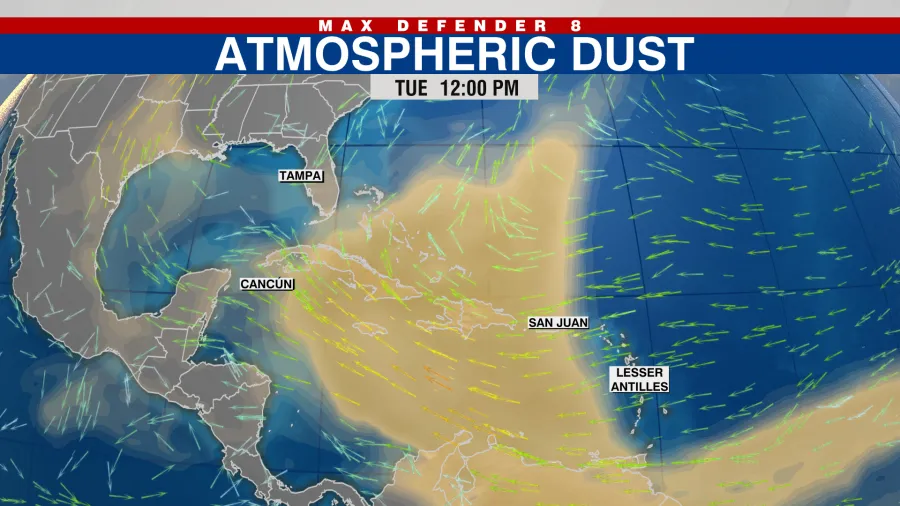Saharan Dust Plume Heads for Florida: What You Need to Know
As summer progresses in the southern United States, weather patterns shift, and so does the atmosphere’s contents. A significant Saharan dust plume is making its way across the Atlantic Ocean, finally reaching Florida’s shores and impacting the weather throughout the Gulf Coast region. This natural phenomenon, while fascinating, brings with it a set of implications for air quality, weather patterns, and even the vibrant beauty of sunsets.
What is Saharan Dust?
Saharan dust originates from the vast desert regions of North Africa, where strong winds pick up fine particles of sand and carry them thousands of miles across the Atlantic. Over the past few weeks, meteorologists have observed a particularly large plume making its way toward the United States, expected to reach Florida and the Gulf Coast in the coming days.
The Journey Across the Atlantic
This dust cloud typically covers a distance of around 5,000 miles, crossing the ocean before reaching the Caribbean and southern parts of the U.S. The journey demonstrates the incredible power of atmospheric currents, which can transport particulate matter across vast distances. Once the dust arrives in Florida, it creates a series of challenges and changes to the local environment.
Impacts on Weather and Air Quality
While the sight of a dust plume heading for the Sunshine State may seem innocuous, there are several significant impacts to consider:
- Air Quality: One of the most immediate effects of Saharan dust is its impact on air quality. The fine particles can exacerbate respiratory issues and contribute to the development of various health concerns for those with pre-existing conditions. Sensitive groups, including the elderly and those with asthma, should take precautions.
- Temperature Changes: The dust particles reflect sunlight, which can lead to cooler surface temperatures. This phenomenon can impact local weather patterns and make for a slightly cooler feel during the hot summer days.
- Storm Development: There is a possibility that the presence of dust can suppress tropical storm formation. The dry air associated with the dust can deter the development of thunderstorms and hurricanes, which is a welcome sign for coastal residents during hurricane season.
Beauty in the Dust: Dramatic Sunsets and Sky Colors
On a more artistic note, the Saharan dust can lead to breathtaking sunsets. As the sun sets over the horizon, the particles scatter the sunlight, creating vibrant hues of orange, red, and pink. Louisiana, Texas, and Florida residents may notice particularly stunning sunsets as the dust plume settles in their region, turning the evening sky into a canvas of color.
Timing and Forecast
The plume is expected to settle over Florida and the Gulf Coast within the next few days. Meteorologists are keeping a close eye on its trajectory and concentration.
In Florida, the presence of the dust is forecasted to peak midweek, with potential impacts lingering a few days afterward. Coastal areas may notice hazy skies as the dust settles.
As it approaches, weather enthusiasts and residents are encouraged to monitor local forecasts to stay updated on air quality advisories and sunset timings.
How to Prepare for the Saharan Dust Plume
In anticipation of the dust plume, those living in affected areas should take the following preventive measures:
- Monitor Air Quality Index (AQI): Check local news sources or weather apps for real-time updates on air quality levels.
- Limit Outdoor Activities: If you have respiratory issues or allergies, consider staying indoors, especially during the dust’s peak concentration times.
- Close Windows and Doors: To limit exposure to dust particles, it’s a good idea to keep windows shut during the duration of the plume.
- Use Air Purifiers: If you have an air purification system, this is an excellent time to use it to keep indoor air clean.
Broader Implications of Saharan Dust Outbreaks
This recent occurrence of Saharan dust is part of a larger climatic pattern that researchers are studying closely. There has been growing evidence that Saharan dust plumes can enhance phytoplankton growth in the Atlantic Ocean. As the minerals in the dust settle on the ocean, they provide essential nutrients that foster marine ecosystems. This, in turn, impacts the entire food web, including fisheries and marine wildlife.
Moreover, the effects of Saharan dust are not limited to the Atlantic coast. In Texas, the dust often leads to hazier skies and has even been associated with reduced visibility during parts of the summer. Local meteorologists report that dust can lead to vibrant morning sunrises and dramatic sunsets as the sun interacts with the particles suspended in the atmosphere.
Conclusion
As Floridians and Gulf Coast residents brace for the upcoming Saharan dust plume, it’s clear that this natural phenomenon presents both challenges and opportunities. From air quality concerns to stunning sunsets, the arrival of Saharan dust reminds us of the ever-changing nature of our environment. Residents should be prepared and informed, taking necessary precautions while also embracing the beautiful skies that come from this unusual event.
Whether you’re watching the sunset paint the sky or taking measures to protect your health, the Saharan dust plume is a multifaceted event that showcases the intricacies of our planet’s weather systems.






